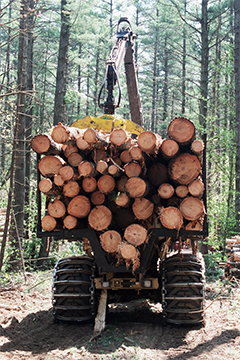TIMBER MARKET WATCH
 The closure of pulp and paper mills in Maine is having a ripple effect throughout the region. In the last few months pulp and paper mills have closed in Lincoln, Old Town, and Madison, Maine. In addition, Verso Paper which has a paper mill in Jay, Maine has gone through Chapter 11 bankruptcy proceedings. They emerged from the proceedings after less than six months, but still face all the challenges their competitors are going through. The problems have been blamed on a lower demand for paper, and competition from paper manufacturers throughout the world. The closure of the Maine paper mills has impacts on log, pulpwood, and biomass chip markets. The most obvious impact is a reduction of the volume of pulpwood used in the region. Changes in the paper market have also shifted the demand toward more hardwood pulpwood being used to make the grades of paper that can be sold. The demand for spruce and fir pulpwood, which once was the most valuable pulpwood, has dropped to the point where it is difficult to even sell in any volume.
The closure of pulp and paper mills in Maine is having a ripple effect throughout the region. In the last few months pulp and paper mills have closed in Lincoln, Old Town, and Madison, Maine. In addition, Verso Paper which has a paper mill in Jay, Maine has gone through Chapter 11 bankruptcy proceedings. They emerged from the proceedings after less than six months, but still face all the challenges their competitors are going through. The problems have been blamed on a lower demand for paper, and competition from paper manufacturers throughout the world. The closure of the Maine paper mills has impacts on log, pulpwood, and biomass chip markets. The most obvious impact is a reduction of the volume of pulpwood used in the region. Changes in the paper market have also shifted the demand toward more hardwood pulpwood being used to make the grades of paper that can be sold. The demand for spruce and fir pulpwood, which once was the most valuable pulpwood, has dropped to the point where it is difficult to even sell in any volume.
The change in pulpwood markets has impacted other forest products markets as well. Logging contractors who have the capability to produce biomass chips are chipping much of the softwood pulpwood just to move it off the landing. This has led in part to an excess supply of biomass chips at the plants that use that product. To exacerbate the problem, a number of biomass plants that generate electricity have closed as their supply contracts with regional electricity purchasers have expired. The new price offered for electricity from these plants is said to be below the cost of generation. The lower oil prices have made it more attractive to generate electricity using oil and natural gas than with biomass. Paper mills that have access to natural gas have been able to generate steam and electricity more cost effectively with natural gas than with biomass chips.
Softwood sawmills are not immune from the impact either. The demand for paper quality softwood chips produced as a byproduct in the milling process has dropped along with the demand for softwood pulpwood. In many cases the paper quality chips are being sold to biomass plants as they have to be moved to keep the sawmill running. This has a double impact. Sawmills are receiving lower prices for their chips and adding supply to a market that is already over supplied. The good news is that softwood lumber markets have been steady enough to keep softwood sawmills producing lumber despite the lower income from byproducts.
The long term impacts of the pulp and paper mill closures is still being determined. As with everything in the forest management realm, one change travels throughout the entire system over time. One positive note is that the paper mill in Rumford, Maine recently restarted an idled paper machine and hired back workers that had been laid off for months. Hopefully this will be a long term condition which will benefit the region. Stay tuned for more news as the markets continue to adjust.
